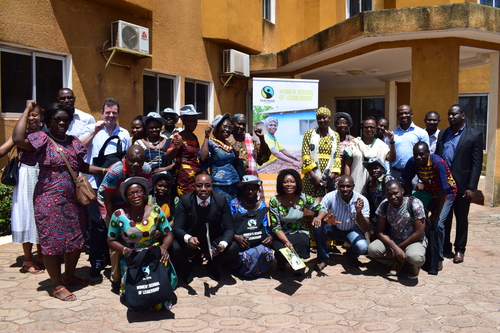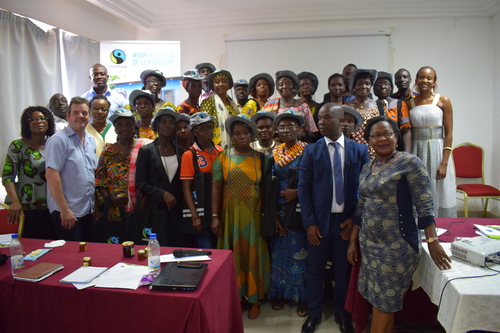Earlier this year we announced the launch of our new EATFAIR range, where 5p from each bar we sell goes towards funding a new Women’s School of Leadership we have launched with Fairtrade.
Earlier this year we announced the launch of our new EATFAIR range, where 5p from each bar we sell goes towards funding a new Women’s School of Leadership we have launched with Fairtrade.
Michelle Gillian, from the Impact Directorate at Fairtrade, went to visit the Women’s School of Leadership school in Cote D’Ivoire to find out more about the programme and what opportunities it is bringing to women in the area.
There are not many job opportunities for female cocoa farmers living in the Cote D’Ivoire. Toiling on their husband’s farms, taking care of their children and putting food on the table means that many women don’t often have the time, support or energy to do more.
Opportunity for Women
These woman represent a huge untapped resource and so Fairtrade, in partnership with Compass Group UK & Ireland and the Co-op, set up the Women’s School of Leadership to support female farmers to generate more income through smarter farming, and give them the confidence and skills to set up businesses and be leaders in the Fairtrade certified cocoa cooperatives that they are part of and in their local communities.
The programme launched in May 2017 and the first group of 19 women and 3 men joined the school. The course is delivered over 1-year and comprised of 4 sessions of 3 days training and an ongoing mentorship programme in their village. Through the programme, the students are supported to start their own business. The course delivers training in subjects including negotiation skills, managing finances and human rights.
Real Enthusiasm
When I visited the programme earlier this year, the second three-day course was just starting. We got the opportunity to speak with some of the students attending to hear how attending the school had changed their lives. As the course had just started I was not expecting the palpable energy and enthusiasm that greeted me in this hot and humid room. The students, aged from mid 20s – to mid 50s, couldn’t wait to stand up and tell us their stories.
For example Madeline, a 40-year old cocoa farmer with three children, felt so empowered after the course that she conquered her fear of public speaking, stood up in front of her fellow farmers at a cooperative meeting and spoke about the importance of promoting the rights of women. Seeing her passion the cooperative appointed her to an official role allowing her the opportunity to promote women’s rights further in her community.
Or take Therese, whose father died when she was young. Her uncle received the land that should have rightfully been hers. In rural Cote D’Ivoire, it remains difficult for a woman to inherit or own her own land. Women, often leave school and marry young, many under 18. Even though most of the work on the farm is done by women, men continue to make all the decisions. Following her attendance at the training Therese went to her uncle and asked for her plot of land back. He refused. So she went to the local sub-prefect who arbitrated on such issues, and he found in her favour. She got her land back allowing her to have her own farm, make her own money helping her and her family.
Not Just Women
Men are also students on the course, working to become gender champions and help spread the word in communities of the benefits of equality and how women can positively contribute to the local economy. One of the men we spoke with Sylvain Beugri – a senior manager in a cooperative – said the course had radically changed his outlook. One of the things he started doing after the course was simply doing the washing up at home. Members of the cooperative would often come to visit after their meetings and see him doing the washing up and say- ‘you’re not made for this, this is woman’s work!’ But as Sylvain went on to explain, ‘I asked them why men can’t do this, and they cannot explain why.’ Underlining that simply asking people why they believe what they believe can lead to small changes that make big differences in people’s lives.
Inclusive, Productive, Happy.
During my time at the school it became clear that the work of the Women’s school of leadership is making a tangible difference to these communities helping them to become more inclusive, productive and happy. As I left the school, it brought home to me how through customers here in the UK, choosing to buy Fairtrade are ultimately making such a difference to the lives of communities like this around the world.


